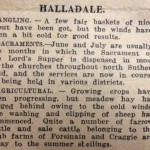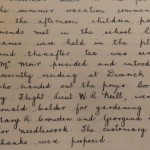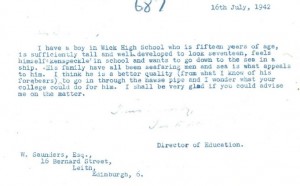On 1 July Rommel launched an attack on the British defences at El Alamein. The fighting, which was to last until the end of the month, is known as the First Battle of El Alamein. The German forces, exhausted after a long advance and short of fuel and ammunition, suffered heavy casualties and were forced to disengage on 5 July. Also this week, Churchill survived a censure motion in the House of Commons. And in Southern Russia, German forces finally completed the conquest of the Crimea while Army Group Four advanced as far as the River Don.
 In the North Highlands, cold weather had been a feature of the summer so far. The John O’Groat Journal reported that, in Halladale, “meadow hay has lagged behind owing to the cold winds. The washing and clipping of sheep has commenced. Quite a number of farrow cattle and sale cattle belonging to the Club farms of Forsinain and Craggie are away to the summer sheilings [mountain pastures].” The unseasonable weather had also affected the anglers’ catches: “A few fair baskets of nice trout have been got, but the winds have been a bit cold for good results.”
In the North Highlands, cold weather had been a feature of the summer so far. The John O’Groat Journal reported that, in Halladale, “meadow hay has lagged behind owing to the cold winds. The washing and clipping of sheep has commenced. Quite a number of farrow cattle and sale cattle belonging to the Club farms of Forsinain and Craggie are away to the summer sheilings [mountain pastures].” The unseasonable weather had also affected the anglers’ catches: “A few fair baskets of nice trout have been got, but the winds have been a bit cold for good results.”

Schools across Caithness were breaking up for the summer holidays. The Head Teacher of Dunnet School recorded in the log book on 3 July: “The summer vacation commenced today. In the afternoon children, parents and friends met in the school. Races and games were held in the playground and thereafter tea was served. Mr Moir presided and introduced Mrs Neill, presently residing at Dwarwick Cottage, who handed out the prizes.”
 Before the holidays started, schools had to get everything in good order. The log book for Barrock School in Bower has the rather terse entry for 4 July, “Spent a great deal of time in the garden this week.”
Before the holidays started, schools had to get everything in good order. The log book for Barrock School in Bower has the rather terse entry for 4 July, “Spent a great deal of time in the garden this week.”
Finally this week, the Director of Education wrote to the Education Committee setting out the position of school meals in the county. Only one school out of 61 had access to “liquid milk”, but in most rural schools pupils brought their own milk with them from home. In Wick, Thurso and Lybster children had Scotch broth for lunch. “In all rural schools there is a mid-day meal consisting of milk, tea, or cocoa along with what I have personally ascertained to be a very substantial ‘piece’ [of bread]. It is comforting in some of those schools to see the mark of the children’s teeth outlined in fresh country butter.”
